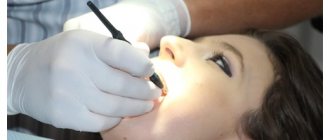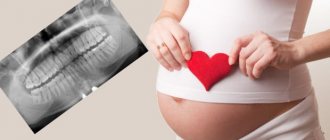07.03.2012
Author: Dentist-therapist Kuzub Yana Nikolaevna, Dentist-periodontist, therapist Stopinskaya Ulyana Yuryevna
Undoubtedly, we all know that during pregnancy the body of the expectant mother undergoes very strong changes associated with hormonal changes.
We will look at what changes occur in a woman’s dental health during pregnancy.
- From the gum side. The so-called “gingivitis of pregnant women” develops. This is a gum condition that affects most expectant mothers. Gingivitis occurs due to changes in the balance of hormones in the blood. In this case, the gums become inflamed, increase in volume and bleed under mechanical stress. And gingivitis is supported by microorganisms that are normally found in the oral cavity, but due to a decrease in local immunity, they have a detrimental effect on the tissues of the oral cavity. And the harmful products of their vital activity, toxins, enter the bloodstream of the expectant mother and have a negative impact on the development of the fetus.
- From the side of the teeth. The mother's body spends a huge amount of resources on bearing and forming the fetus. For the normal formation of a child’s skeleton, a woman’s body requires a very large amount of calcium, phosphorus, fluorine, vitamin D and other minerals. And if a woman does not receive enough of these substances from food, then microelements are taken from the bones and teeth of the expectant mother. And, of course, dental health is greatly deteriorated. Due to weakening of teeth and deterioration of local immunity, as well as the predominance of harmful microorganisms, teeth are several times more susceptible to the development of caries. Which can even be complicated by pulpitis (inflammation of the nerve of the tooth) or periodontitis (infection from the canal into the bone tissue). When these diagnoses occur, the tooth requires urgent treatment, which is difficult due to the special condition of the female body, which often leads to tooth loss. It is important to realize that caries and its complications, and gum disease during pregnancy are a source of infection that must be eliminated. Otherwise, all this can affect the child’s health in the form of a tendency to allergies and a decrease in the newborn’s immunity.
Baby
The 17th week of pregnancy is marked for the baby by an active increase in the mass of his muscles, their gradual strengthening, which allows him to move in the tummy more intensely and variedly. Quite frequent movements of the limbs help the child train muscles and also develop the joints of the knees and elbows. At this stage, the hands are still clenched into fists, rarely unclenched, and only for the purpose of grasping the umbilical cord or sucking a finger. Until 17 weeks, the fetal head was practically motionless, dropped quite low, and the chin was tightly attached to the chest. Strengthening the muscles of the back and cervical region at this stage allows the child to raise his head to an almost vertical position.
Internal organs continue to develop and improve. Their structure only becomes more complex, which contributes to the expansion of functionality. Their preparation will allow you to begin normal, full functioning after the baby is born.
It is important to note the changes that occur in the vascular system and heart of the fetus. The nerve plexuses that surround the heart give rise to the formation of the conduction system; Its uniqueness lies in the fact that the heart does not need signals from the outside to work. All human internal organs obey the central nervous system. The brain sends certain instructions according to which each of the organs works. The heart, in turn, functions with the help of command signals that arise within itself and cause it to contract. The exclusively autonomous mode of operation of the heart allows it to be independent of the level of central nervous system activity throughout a person’s life.
The 17th week of pregnancy is also characterized by the formation of the respiratory system, namely, the strengthening of the lung muscles. Active respiratory contractions resemble inhalation and exhalation and thereby strengthen the muscles of the chest. The formation of the alveolar apparatus of the lungs also occurs. Alveoli are presented in the human body in the form of small bubbles, which are located on the surface of the respiratory apparatus and are responsible for gas exchange. Each breath helps saturate the blood with oxygen. At the 17th week, the alveoli are in a compressed state, but immediately after birth, with the first breath, they will straighten out and be ready for normal functioning.
The weight of the fetus at this stage is about 150 g, and the body length is 12-13 cm.
Future mom
The abdomen is actively growing, and the fundus of the uterus occupies a position midway between the navel and the woman’s pubis. The normal weight gain for a given week is 5 kg. Also, the 17th week of pregnancy is characterized by an increase in the total blood volume of the expectant mother, because her fetus needs intensive nutrition. You may also notice a rapid heartbeat due to large amounts of blood passing through the heart. Additional heart contractions or tachycardia may not be felt at all by the pregnant woman or may cause her discomfort. In case of active manifestation of tachycardia, you should seek help and advice from your gynecologist or cardiologist, who can identify the symptoms of heart disease in a pregnant woman, as well as prescribe the correct treatment to maintain normal well-being.
A sharp increase in the volume of blood in the usual circulation can cause the expectant mother to have an increased level of bleeding gums, as well as nosebleeds. Increased load on the capillaries often leads to a malfunction in their operation. The mucous membranes of the nose and mouth are especially vulnerable. Properly selected vitamin complexes will correct this situation and strengthen the walls of blood vessels. In addition, doctors recommend using a soft toothbrush for hygienic purposes, which will reduce the risk of bleeding gums. It is also recommended to rinse the nasal passages with solutions such as AQUAMARIS, PHYSIOMER, SALIN. You can prepare a similar solution at home if you wish. For this you will need 1 teaspoon of salt and a glass of water. All ingredients should be mixed before use. If these simple recommendations are ineffective and bleeding becomes more frequent, you should seek help from a specialist.
Features of treatment
Before eliminating an unpleasant taste in the mouth, it is imperative to find out the cause of its appearance. To do this, you first need to consult with a therapist, who, after an initial examination and interview, will refer you to a gastroenterologist. Depending on the disease, treatment may involve taking medications or adjusting your diet.
Diet food
If an unpleasant taste appears, especially if it is a symptom of a digestive tract disease, the pregnant woman needs to change her diet. A few recommendations for creating a diet menu:
- exclude smoked, fatty, fried foods from the menu;
- include fresh vegetables and fruits in your diet, but do not get carried away with cabbage and legumes;
- eat more iron-containing foods - buckwheat, apples, pomegranates, seaweed and liver;
- The basis of the dishes should be lean meat and fish, which can be boiled, baked in the oven or steamed.
Equally important is the frequency and regularity of food intake. If you have gastrointestinal diseases, you need to eat often, but the portions should be small. Under no circumstances should you overeat, but you shouldn’t starve either.
Drug therapy
What medications can help with bitterness or sourness in the mouth? Medicines for pregnant women are prescribed only by a doctor, taking into account medical indications. The treatment regimen directly depends on the cause of the unpleasant taste in the mouth. The following groups of medications are most often prescribed:
- prokinetics - affect the motor function of the stomach (Domperidone, Cerucal, Motilium, Itoprid, Fractal, Osetron);
- antisecretory drugs - Rennie, Almagel, Maalox, Phosphalugel;
- preparations containing iron - Maltofer, Aktiferrin, Sorbifer, Ferlatum, Venofer;
- enzymes to improve digestion - Pancreatin, Creon, Mezim, Festal, Somilase;
- multivitamin complexes - Elevit, Vitrum, Complivit Mama, Pregnakea, Materna, Femibion.
Traditional medicine
How to get rid of acid or bitterness in the mouth using traditional methods? The most effective decoctions of medicinal herbs and vegetable juices are:
- To eliminate bitterness, it is recommended to regularly drink vegetable juices, especially carrot juice;
- Potato juice is suitable for rinsing;
- if the unpleasant taste in the mouth is associated with dental problems and inflammation of the gums, rinsing with chamomile decoction will help;
- To disinfect the oral cavity, it is recommended to rinse your mouth with a solution of soda and salt.
Baby
At the 18th week, the child weighs about 200-250 g, and its length is approximately 20 cm. During this period, the structure of the brain becomes more complex, and its total mass also increases; nerve fibers are covered with myelin, a special fatty sheath that promotes accelerated nerve conduction. nerve impulses. After the birth of the child, this shell will allow the child to respond to stimuli from the outside.
The appearance of the fetus already slightly resembles a newborn baby and is actively approaching this state. Facial features become more and more distinct, the ears, which were previously tightly pressed to the head, are straightened, the middle ear is formed, and its perception is also improved. At this stage of pregnancy, the baby can already perceive stimuli from the outside and respond to various kinds of sounds. The noises that occur in the mother’s body due to the active work of the internal organs are completely normal and familiar to him, and also contribute to the training of auditory perception.
It is impossible not to note the intensive work of the fetal endocrine system. At 18-19 weeks, the release of “baby” hormones is large enough that even the mother’s body can be supplied with them. If a woman’s body lacks its own hormones, they are compensated for by children’s hormones, and the mother’s condition returns to normal.
The main causes of an unpleasant taste in the mouth during pregnancy
Why might pregnant women have an unpleasant taste in their mouth—bitter or sour? Experts say that there may be several reasons for this phenomenon, so to understand what causes this unusual taste, you need to pay attention to other symptoms. A sour taste may be a sign of hormonal imbalance, lack of vitamins or diseases of the digestive system.
Physiological and hormonal changes in the body
During pregnancy, significant hormonal and physiological changes occur in a woman's body. In the early stages, many suffer from toxicosis, which manifests itself in the form of nausea, heartburn, and vomiting. In this case, a sour or bitter taste periodically appears in the oral cavity, especially in the morning.
In the second and third trimesters, the reason for the appearance of a sour or bitter taste is not toxicosis, but the growing uterus. Starting from the middle of the term, the uterus begins to increase in size, displacing neighboring organs. It puts pressure on the liver, gall bladder and stomach. As a result, the woman experiences belching and heartburn, which is accompanied by a bitter and sour taste.
Another reason for a strange taste in the morning is high progesterone levels. This hormone has the property of relaxing muscles to reduce the tone of the uterus. At the same time as the myometrium, the esophageal sphincter also relaxes slightly, causing stomach acid to be released into the esophagus.
Various diseases
During pregnancy, many chronic diseases become aggravated. If a woman has previously had problems with the gastrointestinal tract, they can manifest themselves in the form of bitterness and acidity. If you feel unpleasant symptoms, the expectant mother should immediately consult a gastroenterologist for advice.
The table provides a list of diseases that cause an unpleasant taste in the mouth.
| No. | Name of the disease | general characteristics | Associated symptoms |
| 1 | Gastritis | Inflammation of the gastric mucosa, in which atrophy of epithelial cells occurs and glands are replaced by fibrous tissue. | Dyspepsia, burning in the stomach. |
| 2 | Stomach ulcer | A defect in the gastric mucosa causing trophic disorders. | Sour belching, heartburn, weight loss, pain in the epigastric region on an empty stomach. |
| 3 | Gastroesophageal reflux disease | The reflux of stomach contents into the esophagus, which leads to damage to its lower section. | Heartburn, sour belching, cough, sore throat, dry mouth. |
| 4 | Cholecystitis | Inflammation of the gallbladder. | Pain in the right hypochondrium, gradually shifting to the lumbar region and epigastrium, repeated vomiting, high temperature, over time the skin acquires a yellowish tint. |
| 5 | Cholelithiasis | Formation of stones in the gallbladder and ducts. | Sudden cutting pain in the right hypochondrium. |
Lack of vitamins and microelements
A sour or metallic taste in the mouth appears due to a lack of iron and vitamin C. A decrease in hemoglobin levels in the blood is a common occurrence during pregnancy, so doctors often prescribe vitamin complexes and iron-containing preparations to women.
Vitamin deficiency and lack of microelements are usually accompanied by poor health and chronic fatigue. Hair and nails become brittle, skin turns pale. Ulcers and wounds appear on the oral mucosa.
Future mom
This week, some mothers feel the first movements of their baby. Most often, women for whom this is the first child can feel fetal movements at 19-20 weeks. At earlier stages, namely, at 16-18 weeks, those women who already have their own children, and who are also quite thin with a slight layer of fat under the skin, notice movement.
At the first stages, the movements will be rather weak, brief and episodic, but after a short period of time they will become more distinct and more frequent. The nature of the shocks can be different:
- touching;
- light tremors;
- twitching;
- rolling.
For a woman, the first kicks of her baby are very expected. This is an exciting moment that will allow the expectant mother to remember these pleasant sensations with trepidation, and also as proof of her connection with the child. At the 18th week, the baby’s movements are quite chaotic, varied and appear while the baby is awake. With emotional stress, they can become more intense. Also, the child may report an insufficient amount of oxygen, which occurs due to the woman’s lack of movement, insufficient time spent outdoors, as well as being in the same position for a long time (driving a vehicle, at work). Most of the time at this stage of development the fetus sleeps.
Baby
The 19th week is characterized for the fetus by intensive growth of the limbs in length, an increase in size, and a slowdown in head growth. Its length is already 25 cm, and its weight is approximately 250-300 g. The child changes greatly in appearance, his body no longer looks disproportionate.
The fat under the skin allows the relief of the body to change slightly and become rounded. This brown fat is formed at 19-20 weeks. After birth, it is he who will perform the function of thermoregulation and protect the child from hypothermia or overheating. With age, this fat disappears and remains only in certain places: in the thickness of a person’s cheeks, kidney area, under the armpits, and shoulder blades.
At this stage, the formation of permanent teeth, which are located in the dental plate under the rudiments of milk teeth, and the maturation of the brain also occur. Special processes allow connections between neurons to be established. Cells intertwine with each other and create a whole system for transmitting impulses, ensuring the synchrony of the brain. The structures responsible for touch, taste, vision, hearing, and smell are actively developing.
Changes also occur in the hematopoietic system. The spleen is connected to the process of formation of blood cells, produces leukocytes, the task of which is to protect the child’s body from external and internal factors. Until 19-20 weeks, the fetal blood consisted only of red blood cells, and at this stage its composition changes sharply and approaches the composition of the blood of a newborn.
Future mom
The expectant mother's belly is actively growing, and the fundus of the uterus is already located up to 2 cm below the navel. The weight gain is about 3-6 kg and is distributed proportionally between the placenta, uterus, fetus, and amniotic fluid. The weight of the fetus is only a tenth of the total added weight.
Due to the intensive growth of the uterus, a woman may feel discomfort. Often this condition manifests itself when changing body position, bending to the sides, or walking. The nature of pain may vary. These can be nagging, sharp, sudden pains that occur on one or both sides. Stretching of the ligaments that are attached to the side walls of the uterus and pelvic bones in order to fix the uterus occurs quite actively. A woman’s uterus is, as it were, in a suspended state thanks to this ligamentous apparatus. When the ligaments are stretched during changes in the position of the uterus, pain occurs.
This type of pain is completely normal and characteristic of this period of pregnancy. In critical situations, a gynecologist may recommend that a woman take antispasmodics, which will help relax the uterus, as well as eliminate the problem of pain almost completely. At the 19th week, it is important for the gynecologist to exclude such risks of pregnancy complications as the threat of miscarriage and uterine hypertonicity. If one of these risks is detected, the expectant mother will be prescribed hospital treatment.
Why does stomatitis develop during pregnancy?
There are quite a few reasons. The most common include:
- Poor oral care.
- Untreated carious cavities in which bacteria actively multiply, which provoke the development of stomatitis.
- Injury to the oral mucosa (cut or burn). If you accidentally bite your cheek, stomatitis can also develop.
- Eating unwashed fruits or vegetables. Seeds and nuts are also breeding grounds for bacteria.
- Problems with the gastrointestinal tract.
- An allergic rash that can appear on any part of the body, even on the cheeks or tongue.
- Contact with an already infected person.
- Reduced immunity.
Baby
The body length of the baby at this stage is 28 cm, and the weight is about 340 g. Before this week of pregnancy, the length of the fetus was measured by calculating its length from the crown to the tailbone. After the 20th week, the specialist includes in the concept of growth the length of not only the body, but also the lower limbs.
At this stage of development, the child is quite active, makes numerous movements, since there is enough space in the uterus for him to somersault, push off from the walls, as well as other movements. The baby may smile, grasp the umbilical cord, touch himself, frown, and close his eyes. His facial expressions are quite developed and more pronounced than before.
The skin becomes dense, actively covered with vellus hairs and special lubricant. A large amount of this lubricant is found in the folds. This lubricant prevents the risk of mechanical friction, has bactericidal properties, and ensures optimal passage of the fetus through the mother's birth canal during childbirth.
It is impossible not to note the intensive development of the gastrointestinal tract. Small portions of amniotic fluid, which the child swallows, wash the walls of the intestines and stomach, lead to peristalsis training, and promote intestinal contraction.
At the 20th week, amniotic fluid is processed. The first stool formed in the child’s body is meconium. It has a dark green color. It consists of mucus, water, epithelial cells, and bile. Meconium accumulates in the intestinal lumen. On the first day of birth, it comes out.
Future mom
The 20th week marks the end of the first half of a woman's pregnancy. Starting from the next weeks, the load on the body of the expectant mother only increases. This fact can be explained by the active development of the fetus in the womb.
The pregnant woman's abdomen increases significantly, and the fundus of the uterus is already at the level of the navel. During this period, a woman may complain of symptoms of shortness of breath: after all, the uterus is already beginning to put pressure on the lungs. Also characteristic of this week is increased urination. Squeezing the bladder leads to frequent urge.
Discharge from a woman’s vagina also increases. Large blood flow contributes to increased secretion production. The discharge may be mucous or white. It should also be noted that they should not have an unpleasant odor or cause itching or burning. Changes in a woman’s discharge are a reason to consult a doctor, because this can signal the expectant mother about the presence of various types of diseases. Curdled, thick, yellow discharge with an unpleasant odor can signal the presence of sexually transmitted infections and their exacerbation, microflora disturbances, and the manifestation of thrush. Pregnant women are prone to colpitis, since their mucous membrane becomes more attractive to microbes, promotes their active reproduction and thereby increases the risk of contracting an infection to the fetus.
That is why, at the 20th week, women are required to undergo screenings, a smear of secretions for flora, and also undergo a diagnosis of sexually transmitted infections. If any signs of deterioration in the pregnant woman’s condition are detected, the doctor may prescribe further examination and a course of treatment.
What should be the diet for stomatitis?
As the disease develops, a pregnant woman must adjust her diet. It is best to take liquid food in the midst of illness. Various porridges and low-fat soups are suitable. It is strictly forbidden to consume sour berries and fruits, which not only corrode the affected mucous membrane, but can also provoke the formation of new ulcers. Tangerines, oranges, strawberries, etc. Fruits should be excluded for a while. They can be replaced with apples and bananas.
It is better to eat meat only in the form of minced meat, since hard pieces can injure the already inflamed mucous membrane. It is better to exclude too salty and spicy foods. You should avoid coffee and carbonated drinks.










